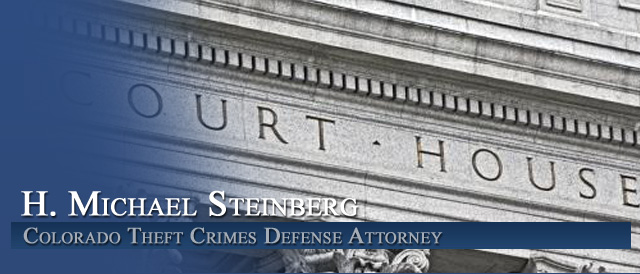




Colorado Extradition Law – Can I Post Bail Before I Am Extradited?
By H. Michael Steinberg Colorado Theft Crimes Criminal Defense Lawyer – Attorney
Colorado Extradition Law – Can I Post Bail Before I Am Extradited? – If you are arrested and held for extradition on an interstate arrest warrant – you are entitled in most cases to try to post bail with the goal of returning to the “demanding state” under the Uniform Criminal Extradition Act.
Posting Bond Under The Uniform Criminal Extradition Act – The Law In A Nutshell
Q: Can I post bail if I am awaiting extradition?
A: In most cases, prior to the receipt of the demanding state’s “Governor’s Warrant” a judge will permit you to post bond with the condition that, if you do not intend to return to the demanding state voluntarily, you agree to surrender when the Governor’s Warrant arrives for your extradition or interstate rendition to that state.
The Colorado Law On Posting Bond In An Extradition Proceeding Is Found In 16-19-114 CRS
§ 16-19-117 Bail Pending Extradition
(1) Unless the offense with which the prisoner is charged is shown to be an offense punishable by death or life imprisonment under the laws of the state or territory or country in which it is alleged to have been committed, or having been convicted of a crime in the demanding state, the fugitive is alleged to have escaped from custody or confinement in the demanding state or to have violated the terms of his or her bail, probation, parole, or sentence, or the fugitive has executed a written waiver of extradition pursuant to section16-19-126, …
….the judge of any district court within the state of Colorado may admit any person arrested, held, or detained for extradition or interstate rendition to another state or territory of the United States or to any foreign country, to bail by bond or undertaking, with such sufficient sureties and in such sum as such judge deems proper, conditioned upon the appearance of such person before the court at a time specified in the bond or undertaking and for such person’s surrender upon the warrant of the governor of this state for such person’s extradition or interstate rendition to another state or territory of the United States or to any foreign country.
When any such person has been served with a governor’s warrant, such person shall no longer be eligible to be admitted to bail.
(2) Before granting the bond provided for in subsection (1) of this section, the judge of the district court within the state of Colorado to whom such application for bail is made shall cause reasonable notice to be served upon the district attorney of the judicial district within which an application is made and also upon the person or authority holding or detaining the person.
The Origins Of The Right Of A State To Demand Extradition
Both the United State Constitution and statutory provisions adopted by the states – Uniform Criminal Extradition Act – determine the scope of the authority of a Judge to grant bail in extradition proceedings.
The United States Constitution – Art. IV, section 2(2), of the United States Constitution, which provides:
“(2) [Fugitives from justice.] A person charged in any state with treason, felony or other crime, who shall flee from justice, and be found in another state, shall, on demand of the executive authority of the state from which he fled, be delivered up, to be removed to the state having jurisdiction of the crime.”
Therefore, Article IV, Section 2, Clause 2, of the United States Constitution places an affirmative duty on the governor of the asylum state to return fugitives from justice upon proper demand of the executive authority of the demanding state.
The Uniform Criminal Extradition Act expressly provides a statutory right to bail “pending service” (prior to the receipt) of the governor’s warrant BUT after the Governor’s Warrant has been served no right to bail exists.
Bail is permissible in any case except those in which an offense is punishable by death or life imprisonment, according to the laws of the demanding state.
The rationale for this later denial of bail follows:
“[B]ecause the fugitive is being held for another state he should be readily available to be turned over to those who arrive to return him. A presumption exists that the demanding state will accord the fugitive all his legal rights, including that of bail. A special obligation to deliver a fugitive is owed to a sister state – an obligation which makes bail inappropriate after the stage when issuance of the governor’s warrant is reached.”
If You Fight The Extradition Using The Habeas Corpus Procedure – Or You Waive The Service Of The Governor’s Warrant – You Will Lose Your Right To Bail
If you make the decision to try to fight extradition using a procedure called a petition for habeas corpus you will also be denied the right to bail.
The “Extradition Act” authorizes bail only during the extradition process and terminates that authority upon the “conclusion of that process” – that is when the demanding state’s Governor’s rendition warrant is issued. Likewise the admission to bail terminates when the extradition process terminates if you execute a “waiver of extradition” in writing.
Since bail is only available during an extradition proceeding if there is no waiver, I usually advise my clients not to waive or contest extradition – but to seek bail and the Judge’s permission to leave the state and voluntarily return to the demanding state – where the client will be required to post THAT state’s bond.
Understanding The Decision To Waive Extradition Proceedings
An individual held for extradition on a warrant from another state may waive the extradition process and consent to voluntary return to the demanding state. That decision can be made at ANY TIME but it must be in writing and contain a consent to return to the demanding state.
A trial judge can only accept a waiver of extradition after he or she has informed the accused of the right to demand the issuance of a Governor’s Warrant of Rendition AND the right to petition the Court for a Writ of Habeas Corpus.
Once the waiver is executed the Governor’s Warrant is no longer necessary and the accused cannot be released on bail in the absence of consent of the officials from both states – which never occurs.
Summary – Bail Under The Criminal Uniform Extradition Act
Bail is permissible in any case except those in which an offense is punishable by death or life imprisonment, according to the laws of the demanding state.
The court may admit the accused to bail on two conditions:
(1) His appearance before the court at a time specified in the bond; or
(2) His surrender for arrest upon the Governor’s Warrant of Rendition.
The amount of the bond and the terms of the bond are with the Court’s discretion.
If the fugitive fails to appear in the demanding state if permitted to voluntarily return to that state or fails to meet the conditions of bond (above) the individual is then subject to arrest without warrant on order of the court and forfeiture of the bond posted during the extradition process is permitted.
The Uniform Criminal Extradition Act (UCEA2)
The UCEA2 has been adopted by 48 of the 50 states, (the only exceptions being South Carolina and Missouri). The Act sets forth the process by which a state may request surrender of a wanted individual and the manner in which that individual is surrendered.
While there are some variances among the Act as adopted by the states, the principal requirements for extradition are as follows:
A valid arrest warrant issued by the demanding state
A request from the Executive Authority of the demanding state (typically the Governor)
A judicial hearing in the state having custody of the wanted person
A waiver of extradition by the wanted person or a judicial finding that the Governor’s request follows all legal requirements if extradition is not waived
Custody taken by the demanding state of the wanted person within 30 days
If the demanding state does not take custody within 30 days, the prisoner may be discharged.
Colorado Extradition Law – Can I Post Bail Before I Am Extradited?
If you found any of the information I have provided on this web page article helpful please click my Plus+1 or the Share buttons for Twitter and Facebook below so that others may also find it.
If, after reading this article, you have questions about your case and would like to consider retaining our law firm, we invite you to contact us at the Steinberg Colorado Criminal Defense Law Firm – 303-627-7777.
Never stop fighting – never stop believing in yourself and your right to due process of law.
ABOUT THE AUTHOR: H. Michael Steinberg – Email The Author at:
 A Denver Colorado Criminal Defense Lawyer – or call his office at 303-627-7777 during business hours – or call his cell if you cannot wait and need his immediate assistance – 720-220-2277. Attorney H. Michael Steinberg is passionate about criminal defense. His extensive knowledge and experience of Colorado Criminal Law gives him the edge you need to properly handle your case.
A Denver Colorado Criminal Defense Lawyer – or call his office at 303-627-7777 during business hours – or call his cell if you cannot wait and need his immediate assistance – 720-220-2277. Attorney H. Michael Steinberg is passionate about criminal defense. His extensive knowledge and experience of Colorado Criminal Law gives him the edge you need to properly handle your case.
“A good criminal defense lawyer is someone who devotes themselves to their client’s case from beginning to end, always realizing that this case is the most important thing in that client’s life.”
You should be careful to make a responsible choice in selecting a Colorado Criminal Defense Lawyer – and we encourage you to “vet” our firm. Over the last 40 plus years – by focusing ONLY on Colorado criminal law – H. Michael has had the necessary time to commit to the task of constantly updating himself on nearly every area of criminal law, to include Colorado criminal law and procedure and trial and courtroom practice. H. Michael works hard to get his clients the best possible results in and out of the courtroom. He has written, and continues to write, extensively on Colorado criminal law and he hopes this article helps you in some small way – Colorado Extradition Law – Can I Post Bail Before I Am Extradited?

Other Articles of Interest:
- 2014 Criminal Court Deadlines Under Colorado Criminal Law – When You Have To File – What You Have To Do
- Understanding The Colorado Identity Theft Law |18-5-902
- What Happens When Colorado Criminal Laws Change – Cui Bono? (Who Benefits)
- “I Am In Prison And I Have A Second Case” – The Colorado The Uniform Mandatory Disposition of Detainers Act (“UMDDA”)
- Understanding The Crime of Receiving Stolen Property In Colorado












